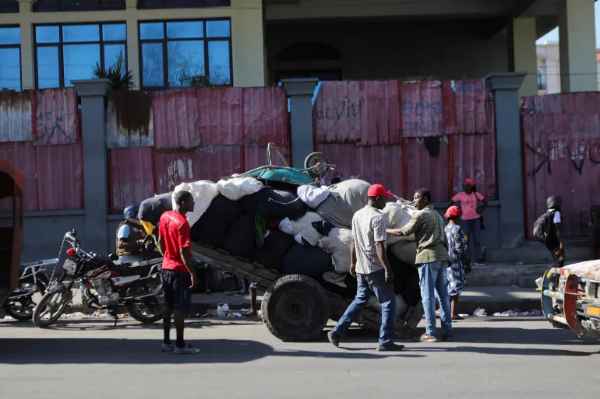Thousands displaced as Haiti’s ‘rapidly deteriorating’ crisis raises alarm
Tens of thousands of Haitians flee their homes across the capital Port-au-Prince amid spiralling gang violence.
United Nations Secretary-General Antonio Guterres is “deeply concerned” by the situation in Haiti, as a surge in gang violence has displaced tens of thousands of people and effectively paralysed the capital of Port-au-Prince.
Guterres’s spokesman Stephane Dujarric told reporters on Monday that the city faces a “rapidly deteriorating security situation”.
“Armed gangs have intensified their attacks on critical infrastructure over the weekend, including on police stations and two penitentiaries,” he said, relaying the secretary general’s concerns.
Haiti has been plagued by widespread gang violence for more than two years, since the July 2021 assassination of President Jovenel Moise.
The country’s de facto leader, Prime Minister Ariel Henry, whom Moise chose for the post just days before he was killed, has faced a crisis of legitimacy. Attempts to chart a political transition for Haiti have failed, and armed groups have fought to fill the power vacuum.
The resulting violence has impeded access to healthcare facilities, forced the closure of schools and worsened an already dire hunger crisis by cutting residents of gang-controlled areas off from critical supplies.
The situation deteriorated further on Saturday when gunmen overwhelmed the main penitentiary in Port-au-Prince and another nearby prison, freeing thousands of inmates in a raid that left several people dead.
The Haitian government declared a state of emergency on Sunday evening and imposed a three-day nightly curfew to try to restore order.
But some of Haiti’s most powerful gang leaders — including Jimmy “Barbecue” Cherizier, who heads the powerful G9 gang alliance — say their goal is to bring down Henry.
The Haitian prime minister was in Kenya last week when the latest unrest began. The visit aimed to revive plans for a possible UN-backed police deployment to Haiti to help stem the country’s gang violence.
The two countries signed a “reciprocal” agreement to deploy police from the East African country to Haiti, Kenyan President William Ruto said on Friday, but it remains unclear if and when the deployment might happen.
“Henry has not made any public announcements or has been seen since Friday, when he was in Nairobi,” Renata Segura, the deputy director for Latin America and the Caribbean at the International Crisis Group, a nonprofit think tank, wrote in a post on social media on Monday afternoon.
“With an already very thin grasp on power, Henry’s silence speaks volumes.”
O’Neill added that an international force to Haiti must be “well led, well equipped, [and] with the right mandate”.
“What happens if there is no force? You’re just going to have a spiralling downward into the chaos and violence that you just saw this past weekend.”
In Port-au-Prince on Monday, an Agence France-Presse reporter said some locals were on the streets looking to buy water and fuel.
Schools and banks were closed amid the latest uptick in violence, and people sheltered for safety in schools, sports venues, gyms and public buildings, often without adequate toilets, health facilities or drinking water.
“This morning, the city is paralysed,” Carlotta Pianigiani, a coordinator in Port-au-Prince for the Alima medical NGO, told the news agency.
“Public transport is practically at a standstill, private vehicles are rare, and schools are closed. Some roads are also barricaded.”
Pianigiani said 15,000 people were displaced in the recent unrest and that the largest public hospital suspended its operations last week. She added that the situation had been “already very tense”.
Meanwhile, Doctors Without Borders, known by its French initials MSF, said early on Sunday that its Tabarre hospital in Port-au-Prince added 20 beds to respond to an increase in injured people arriving for treatment.
Since the end of February, the hospital has received at least 10 wounded patients each day as a result of armed clashes.
“MSF needs medical supplies that are now at the city’s port but are not currently accessible. MSF is very concerned about the possibility of running out of supplies,” the group posted on social media.
“Tens of thousands of people had to flee their homes, leaving everything behind, and are now displaced in different areas of Port-au-Prince.”
This article was syndicated from Al Jazeera (https://www.aljazeera.com/) and was originally published on 03 March 2024.


 Download PDF
Download PDF